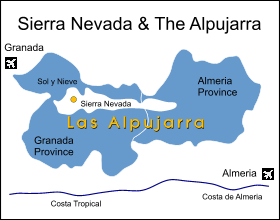 The Alpujarras straddle the border between Granada and Almería provinces. Juvíles is in the highest part, in Granada province, on the southern foothills of the Sierra Nevada. There’s some debate over the origin of the name, but "Alpujarra" may come from Arabic terms for "grassland". The area is studded with white-washed villages featuring the characteristic architecture that’s hardly changed since the Muslims were expelled in the 16th century.
The Alpujarras straddle the border between Granada and Almería provinces. Juvíles is in the highest part, in Granada province, on the southern foothills of the Sierra Nevada. There’s some debate over the origin of the name, but "Alpujarra" may come from Arabic terms for "grassland". The area is studded with white-washed villages featuring the characteristic architecture that’s hardly changed since the Muslims were expelled in the 16th century.All of the villages in the Alpujarra are worth exploring, and many have decent restaurants and bars, interesting shops and weekly markets. From Juvíles it’s about ten minutes to the next village of Bérchules, or in the other direction, the highest community in Spain at Trevélez. The sizeable town of Cádiar is about twenty minutes away in the valley, and it takes about forty-five minutes to drive to the coast. You can get to Granada city-centre (or the Alhambra) in about an hour and twenty minutes, and once you leave the mountain roads for the motorway, you can get around the whole of Andalucía quite quickly. There is a bus service from Granada to Juvíles, but realistically you need a car.
The Alpujarra (the "s" is optional, and in the local dialect, it’s silent anyway) was the centre of an important silk industry during the Muslim era, and was the last stronghold of the Moors after the fall of Granada. The North African influence is still evident in the architecture (the houses look a lot like they do in the Atlas mountains of Morocco), and in a cuisine that uses lots of cumin, almonds, saffron and paprika (the pork is rather less Islamic). Most people still work the land or make a living by combining several part-time jobs. Very few local people speak any English. Mealtimes are late compared with Northern Europe, with lunch normally taken between two and four. The siesta is still part of life, especially in summer, and businesses usually close between two and five, often staying open until nine or ten. Granada province is one of the last places in Spain where tapas are generally still given free, and in the bars here you will often get quite substantial complimentary food when you order beer or wine. A couple of rounds of drinks will normally bring enough free food to constitute a light dinner.

The nearest airports to the Alpujarra are Granada (flights from London, Liverpool, Nottingham, Milan, Frankfurt, Madrid, Barcelona) and Almería (flights from London, Manchester, Munich and Dusseldorf, amongst others). Each is less than ninety minutes away. Málaga airport has many more services and is about 3½ hours away (the new motorway should lessen this journey time considerably). Airports at Murcia, Seville, Jerez and Gibraltar (each around 5 hours) are not out of the question if you get a good flight deal.
At this altitude it can get very cold in winter. Spring comes early, and for most of the year you can expect bright sunshine, hot days and warm nights. Weather conditions change very quickly, however, with fog and rain suddenly coming out of nowhere and passing again just as quickly. You should bring a waterproof jacket (and probably a sweater) at any time of the year. Prepare carefully for walking and make sure you have good footwear, protection from the sun, a map or accurate directions, and most importantly in hot weather, plenty of water.


Si Ud. habla castellano, es posible que ya conozca algo sobre nuestro parte de España. Brevemente Juvíles se ubica en el parte mas alto de la Alpujarra, en el lado sur de la Sierra Nevada. La área está llena de pequeños pueblos blancos, con una arquitectura caracteristica que ha cambiado poco desde la expulsión de los Moros en el siglo 16.
Cada pueblo de la Alpujarra vale una exploración, y unos entre ellos tienen buenos restaurantes, tiendas interesantes y mercados semanales. Desde Juvíles, el paseo en coche hasta el proximo pueblo de Bérchules dura diez minutos o, en el otro sentido, lo mismo hasta Trevélez, el pueblo mas alto de España. Necesita veinte minutos para alcanzar a Cádiar, y 45 hasta la costa. Granada capital está a una hora y 20 minutos. Hay un servicio limitado de autocarros desde Granada, pero de verdad, Ud. necesita un coche.

La Alpujarra estaba un centro de la industria de seda durante la era de los Moros, y la región fue la última fortaleza de los musulmanes en España. La influencia africana es todavía evidente en la arquitectura (las casas parecen a ellas de Maruecos), y en la cocina en que figura cominos, almendras, azafrán y pimentón (aunque el uso de carne de cerdo es poco islamico). La mayoría de la gente trabaja todavía en el campo o se gana la vida en haciendo una variedad de pequeños empleos. Granada queda una de las últimas provincias donde se dan normalmente todavía gratis las tapas en los bares.
En coche, nuestro pueblo está a 80 minutos de Granada capital y su aeropuerto, y a seis horas, más o menos, de Madrid.
En esta altitud, puede hacer frio en invierno, y las condiciones metereológicas cambian muy de repente. Es aconsejable traer un impermeable y un sueter, también en verano. Preparese cuidadosamente por el senderísmo, asegurando que tiene calzado adequado, protección contra el sol, mapas y agua suficiente.





No comments:
Post a Comment